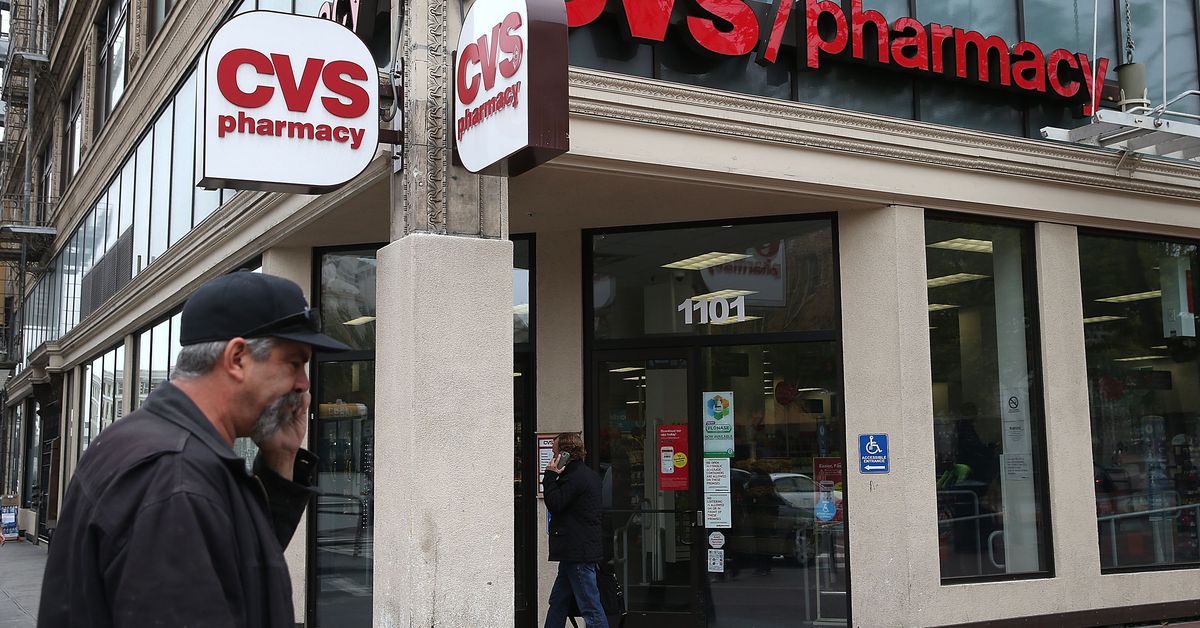Why CVS is spending $8 billion to bring back physician house calls
CVS has pivoted from a pure pharmacy business to offering direct health care services. | Justin Sullivan/Getty Images The return of the doctor house call isn’t a comeback. It’s a harbinger. CVS announced on Monday that it plans to buy Signify Health, a network of more than 10,000 clinicians that provide in-person evaluations and care for US patients at their homes, along with virtual telehealth visits. The $8 billion acquisition is a major bet for the 59-year-old pharmacy chain. It’s also an attempt to resurrect a relatively old concept: the doctor’s house call. CVS is just one of several companies, including Amazon and Walgreens, that has recently been investing in at-home health care. The reason why is simple: The number of people aged 65 and older in the US could practically double by 2060, which means demand for medical care will almost certainly grow, too. Completing a medical appointment at home can be safer for people who face difficulties leaving the house. The return of the house call is also part of a broader transformation in how health care is delivered and, perhaps more importantly, who delivers it. Like CVS, many of the companies investing in at-home care aren’t traditional health care providers, and they’re interested in using tech to take on far more than just home-based medical appointments. CVS, for its part, has made no secret of the fact that it’s looking to shift gears and become a tech-focused health care company (the chain officially changed its name to CVS Health in 2014). This plan involves closing about 1,000 of its nearly 10,000 US pharmacies over the next few years, while also turning some of its remaining retail locations into clinics that can provide urgent, primary, and mental health care along with traditional pharmacy services. The company already owns the insurance company Aetna, the prescription benefits management service Caremark, and a nursing home-focused pharmacy service called Omnicare. Fresh off launching a virtual telehealth platform earlier this year, CVS is now adding doctors, nurses, and physician assistants that travel to people’s homes, too. “The CVS concept? It’s quite a brilliant umbrella that they have created,” explains Tara Cortes, the executive director of the Hartford Institute for Geriatric Nursing at New York University. “They really do have the entire package of providing a holistic approach to keep people at their highest potential of wellness, and safe in their homes.” House calls currently constitute a relatively small share of doctor’s appointments in the US. Physicians used to travel directly to patients’ homes — before cars, often via horse — but primary care practices that patients traveled to became the dominant way people received health care throughout the 20th century. While house calls made up 40 percent of doctor-patient encounters in 1930, they were just 10 percent of those encounters two decades later, and just 0.6 percent by 1980, according to a New England Journal of Medicine study. Today, home health visits are mainly an option used by people with certain health conditions, patients recovering after hospital stays, and older people who benefit from seeing clinicians at home. Often, the people who use these services have Medicare Advantage plans, which allow people to incorporate private coverage, including for home care, to supplement their Medicare plans. Some think home-based medical appointments are due for a tech-embellished renaissance. The rise of telehealth, along with new connected devices — remote monitors, for instance, can automatically update physicians about patients’ vital statistics — has made at-home medical appointments easier to facilitate. Generally, sending a nurse or doctor to a patient’s home can be a more comfortable experience for the patient, and it also gives clinicians insight into a patient’s daily life and practices. Some have speculated that the kind of data that Signify could potentially collect, including information about what patients eat and their relationships at home, could make delivering health care more effective, though it’s also sure to raise real concerns about data privacy, too. But, like all things, there are real downsides. Some experts say the massive expansion of large pharmacies into many different aspects of health care could disadvantage the independent pharmacies that already exist. There are also broader antitrust concerns. The FTC is already investigating Amazon’s plans to purchase the primary care network One Medical, and competition experts have warned that CVS could face similar hurdles for its plan to buy Signify Health. “CVS seems to be intent on dominating all facets of health care provision with this acquisition, and going into home health visits is part of that ambition,” explains Stacy Mitchell, the co-director of the Institute for Local Self-Reliance, a nonprofit that advocates for local solutions. “There’s real concern about the imp


The return of the doctor house call isn’t a comeback. It’s a harbinger.
CVS announced on Monday that it plans to buy Signify Health, a network of more than 10,000 clinicians that provide in-person evaluations and care for US patients at their homes, along with virtual telehealth visits. The $8 billion acquisition is a major bet for the 59-year-old pharmacy chain. It’s also an attempt to resurrect a relatively old concept: the doctor’s house call.
CVS is just one of several companies, including Amazon and Walgreens, that has recently been investing in at-home health care. The reason why is simple: The number of people aged 65 and older in the US could practically double by 2060, which means demand for medical care will almost certainly grow, too.
Completing a medical appointment at home can be safer for people who face difficulties leaving the house. The return of the house call is also part of a broader transformation in how health care is delivered and, perhaps more importantly, who delivers it. Like CVS, many of the companies investing in at-home care aren’t traditional health care providers, and they’re interested in using tech to take on far more than just home-based medical appointments.
CVS, for its part, has made no secret of the fact that it’s looking to shift gears and become a tech-focused health care company (the chain officially changed its name to CVS Health in 2014). This plan involves closing about 1,000 of its nearly 10,000 US pharmacies over the next few years, while also turning some of its remaining retail locations into clinics that can provide urgent, primary, and mental health care along with traditional pharmacy services. The company already owns the insurance company Aetna, the prescription benefits management service Caremark, and a nursing home-focused pharmacy service called Omnicare. Fresh off launching a virtual telehealth platform earlier this year, CVS is now adding doctors, nurses, and physician assistants that travel to people’s homes, too.
“The CVS concept? It’s quite a brilliant umbrella that they have created,” explains Tara Cortes, the executive director of the Hartford Institute for Geriatric Nursing at New York University. “They really do have the entire package of providing a holistic approach to keep people at their highest potential of wellness, and safe in their homes.”
House calls currently constitute a relatively small share of doctor’s appointments in the US. Physicians used to travel directly to patients’ homes — before cars, often via horse — but primary care practices that patients traveled to became the dominant way people received health care throughout the 20th century. While house calls made up 40 percent of doctor-patient encounters in 1930, they were just 10 percent of those encounters two decades later, and just 0.6 percent by 1980, according to a New England Journal of Medicine study. Today, home health visits are mainly an option used by people with certain health conditions, patients recovering after hospital stays, and older people who benefit from seeing clinicians at home. Often, the people who use these services have Medicare Advantage plans, which allow people to incorporate private coverage, including for home care, to supplement their Medicare plans.
Some think home-based medical appointments are due for a tech-embellished renaissance. The rise of telehealth, along with new connected devices — remote monitors, for instance, can automatically update physicians about patients’ vital statistics — has made at-home medical appointments easier to facilitate. Generally, sending a nurse or doctor to a patient’s home can be a more comfortable experience for the patient, and it also gives clinicians insight into a patient’s daily life and practices. Some have speculated that the kind of data that Signify could potentially collect, including information about what patients eat and their relationships at home, could make delivering health care more effective, though it’s also sure to raise real concerns about data privacy, too.
But, like all things, there are real downsides. Some experts say the massive expansion of large pharmacies into many different aspects of health care could disadvantage the independent pharmacies that already exist. There are also broader antitrust concerns. The FTC is already investigating Amazon’s plans to purchase the primary care network One Medical, and competition experts have warned that CVS could face similar hurdles for its plan to buy Signify Health.
“CVS seems to be intent on dominating all facets of health care provision with this acquisition, and going into home health visits is part of that ambition,” explains Stacy Mitchell, the co-director of the Institute for Local Self-Reliance, a nonprofit that advocates for local solutions. “There’s real concern about the implications of that dominance in an industry that is already highly consolidated.”
Still, CVS is far from the only company involved in this effort. Amazon also bid to buy Signify, and its employer health care program Amazon Care offered an at-home appointment option before it shuttered earlier this year. Just last week, Walgreens finalized a $330 million investment in CareCentrix, a platform that facilitates at-home care for patients after they’ve been discharged from hospitals. In 2020, the insurance company Humana bought a $100 million stake in Heal, a telemedicine and home health care service that’s already available in several states. The company already owns the home health care services provider Onehome.
Only time will tell whether CVS’s proposal passes regulators’ scrutiny, and it’s not guaranteed that the company’s foray into home health care will ultimately be popular among patients. Still, it’s already clear that the return of the house call isn’t really a throwback. Instead, it’s just one part of a new era of health care, one where traditional doctors’ offices and pharmacies are far from the only players. That’s “competition,” Cortes explains, “that the traditional health care system never had.”
This story was first published in the Recode newsletter. Sign up here so you don’t miss the next one!
This article has been sourced from various publicly available news platforms around the world. All intellectual property rights remain with the original publishers and authors. Unshared News does not claim ownership of the content and provides it solely for informational and educational purposes voluntarily. If you are the rightful owner and believe this content has been used improperly, please contact us for prompt removal or correction.











